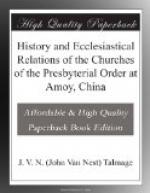One of the essential principles of our Church polity is, that individual Churches are not independent of each other. They are members one of another. They are to be subject to each other. They are individual parts of a whole. Each part should be subject to the whole. Hence the necessity of higher judicatories. Thus we felt that these five churches had a right to an ecclesiastical organization, by which they might enjoy this essential principle of Presbyterianism. [I trust we shall hear no more of the charge that the Missionaries at Amoy are Congregationalists.] But we were afraid to give this organization to the native churches, lest we should give offense at home. We knew that we were misunderstood, and as yet could see no way to make the Church acquainted with our position and our views. If the Master should plainly call us to go forward, of course we must obey, and leave the results with Him.
These churches, having grown out of each other, were essentially one, and were as closely united together as it was possible for them to be, without a formal organization. The first formal meeting of all these churches was held at Chioh-be (a church under our care), in 1861. No ecclesiastical power was assumed. The next similar meeting was held in April, 1862, in the churches at Amoy. This was still more formal. It was composed of all the Missionaries of our own and of the English Presbyterian Church, and of one representative Elder from each of the five organized churches. This body may be called an incipient Classis. The only ecclesiastical power exercised, however, was connected with church discipline. Heretofore each individual Church, in connection with the Missionaries, had exercised the power of discipline, even to excommunication. Now certain cases of excommunication were referred by individual Consistories to, and acted on by, this body. Is it necessary to defend such acts? We felt that if each individual church could exercise such power, and the principles of our Presbyterianism be scriptural, then could a body, composed of the representatives of these churches, together with the Missionaries, with safety exercise such power. It was approaching as nearly as possible to the practice of our Church at home. We expected soon to be called to the performance of ecclesiastical acts more momentous. Already had two of the churches chosen two of the native members, who were now engaged in careful study, that in due time they might be set apart to the office of the Ministry of the Word, and ordained pastors of the churches respectively choosing them. But for reasons given above we would not go forward faster than we were plainly led by the hand of Providence. Therefore, while the Missionaries, in presence of this assembly, examined these pastors-elect, in reference to their qualifications for the office of Pastor, the body, as such, took no part in the examination.




